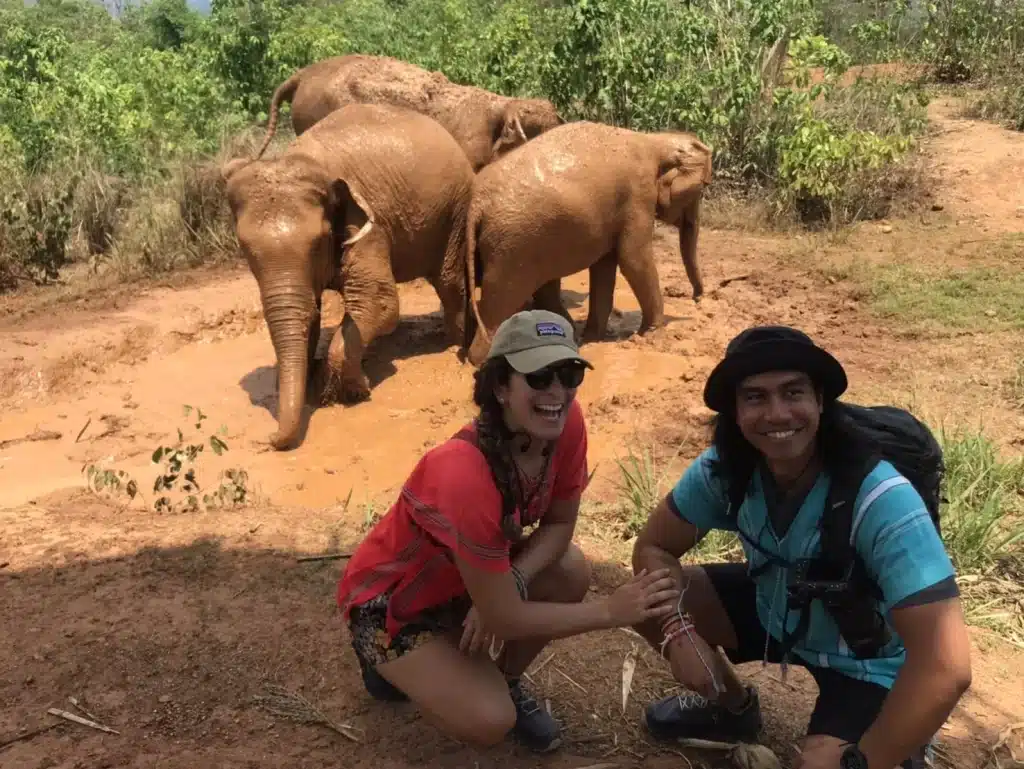The Natural Habitat of Elephants: Contrasting Life in the Wild vs Captivity at an Elephant Nature Park In Chiang Mai
Elephants are magnificent creatures that have captivated the human imagination for centuries. They are known for their intelligence, social behavior, and impressive physical presence. In the wild, elephants live in diverse habitats such as savannas, forests, and grasslands. However, many elephants are now in captivity at elephant nature parks worldwide due to various factors, including habitat loss and human-wildlife conflict. This post will explore elephants’ natural habitat and compare the differences between wildlife and captivity at our Elephant Nature Park in Chiang Mai, Thailand.
Life in the Wild
In their natural habitat, elephants live in awe-inspiring social structures led by matriarchs, the herd’s oldest and most experienced females. They communicate through various means, including vocalizations, body language, and even infrasound, which can travel vast distances. Elephants can roam and forage for food in their large home ranges, spanning hundreds of square kilometers. Their habitat is a treasure trove of diverse plant species, each fulfilling a unique role in their nutritional needs.
Challenges in the Wild
Life in the wild is a testament to the resilience of elephants. Despite the encroachment of human activities like deforestation and urbanization, which have led to a loss of their natural habitat and sparked conflicts with humans, elephants continue to persevere. These conflicts, detrimental to both elephants and local communities, are a stark reminder of the threats they face. The persistent menace of poaching for ivory and other body parts further adds to the peril faced by wild elephant populations, yet they stand strong.
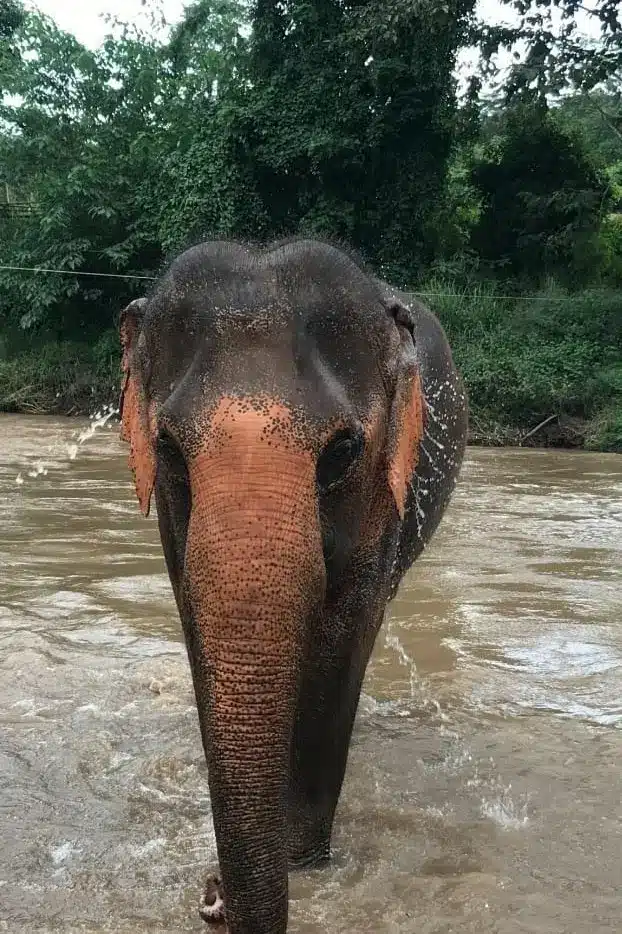
Life in Captivity at an Elephant Nature Park
Elephant nature parks, on the other hand, offer a beacon of hope. They act as sanctuaries, rescuing elephants from industries that exploit them, such as logging, circuses, and tourism. In these parks, elephants receive comprehensive care, protection, and access to veterinary services. They are provided with ample food, water, and enrichment activities, ensuring their physical and psychological well-being. Visitors to these parks can observe and interact with elephants in a more controlled and safer environment, fostering a better understanding and appreciation for these magnificent creatures.
Challenges in Captivity
While an elephant nature park offers a safer and more controlled environment for elephants, there are still challenges associated with keeping these intelligent animals in captivity. Some concerns include restricted movement, limited social interactions, and the loss of natural behaviors such as foraging over large distances. Captive elephants may also face health issues related to diet, exercise, and stress. Balancing the welfare of elephants in captivity with the educational and conservation goals of nature parks is an ongoing challenge.
The Elephant Freedom Project allows these incredible creatures to roam freely at our Elephant Nature Park in Chiang Mai. If you can experience one of our tours, you will see much land dedicated to elephant welfare.
The manager of our sanctuary, Thorn, is a local villager in Mae Wang who has worked with elephants his entire life. He attempts to find the correct balance between offering an ethical elephant experience and the welfare of the elephants.
This balance has been achieved. The elephants truly enjoy seeing our guests and look forward to the day’s various activities. We have attempted to incorporate the elephant’s natural activities in the wild into our daily tours. This has worked out to be the perfect balance. We make clear to our guests that we should allow the elephants to roam as freely as they would in the wild. We follow the elephants as they journey through our elephant nature park in Chiang Mai.
Comparison and Contrast
When comparing life in the wild to captivity at an elephant nature park, it is clear that both settings have advantages and disadvantages. In the wild, elephants can express their natural behaviors, form intricate social bonds, and roam vast landscapes. However, they also face threats from habitat loss, poaching, and human-wildlife conflicts. On the other hand, elephants in captivity benefit from protection, care, and veterinary support but may experience limitations in movement, socialization, and behavioral expression. Enough land goes a long way to a positive environment for these majestic creatures.
Education and Awareness
In providing a safe environment for elephants, our Elephant Nature Park in Chiang Mai also focuses on education and raising awareness about the importance of elephant conservation. Through guided tours, educational sessions, and outreach initiatives, these parks help educate the public about the threats facing elephants and what can be done to protect them.
The Need for Continued Support
As the threats facing elephants continue to evolve, the role of Elephant Nature Parks in elephant conservation becomes increasingly important. Governments, organizations, and individuals must support these initiatives through funding, volunteer work, and advocacy.
From Chains to Freedom: Elephant Nature Park In Chiang Mai
Elephant Nature Parks work tirelessly to rescue elephants from abusive situations. This may involve negotiating with owners, confiscating elephants from illegal camps, or rescuing elephants from dangerous or neglectful environments. Once the elephants are brought to the
Wild Elephants
Wild elephants typically follow a daily routine that revolves around finding food and water and ensuring the well-being of their herd. In the wild, elephants roam vast distances for vegetation to eat and water to drink. Their day starts early in the morning as they search for food, which makes up a significant portion of their daily activities.
Elephant Nature Park Residents
Elephant Nature Parks are sanctuaries where rescued elephants live in a safe and natural environment. The daily routines of elephants in nature parks are quite different from those of their wild counterparts. In these sanctuaries, elephants are not required to search for food or water, as caretakers provide them with these.
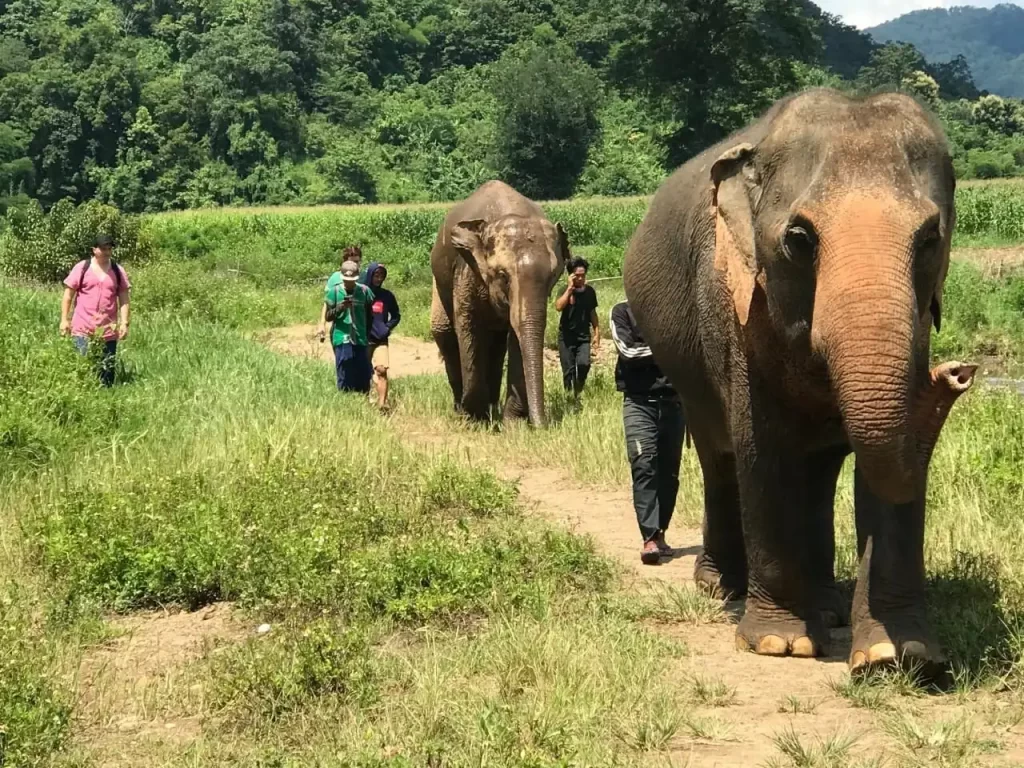
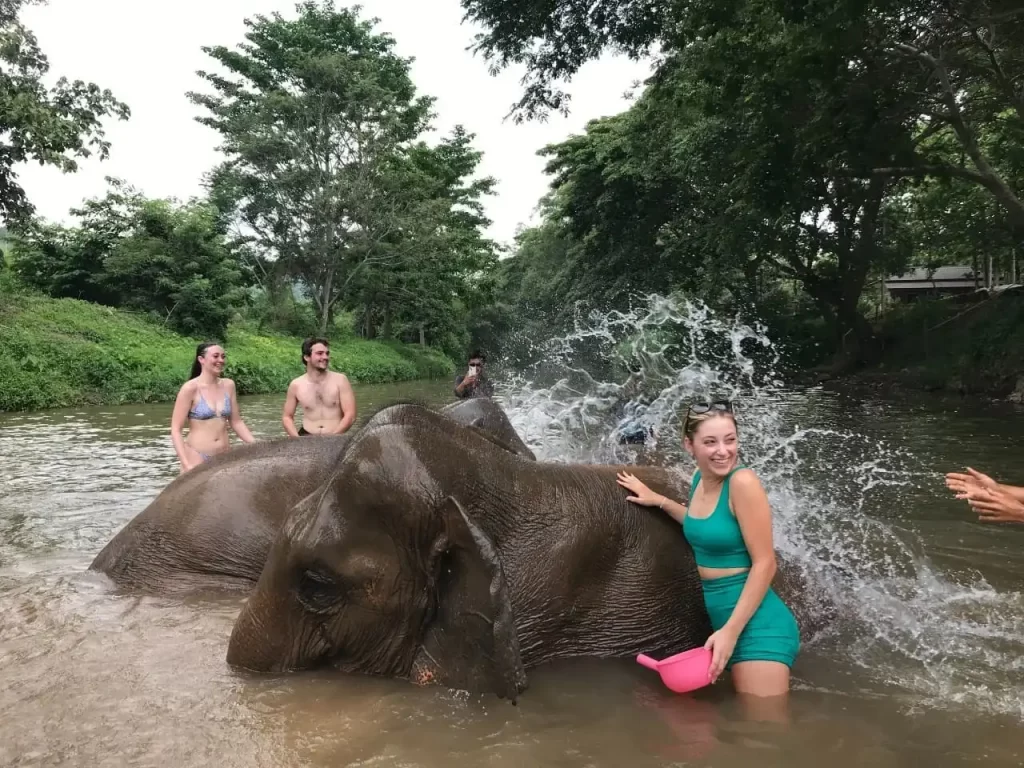
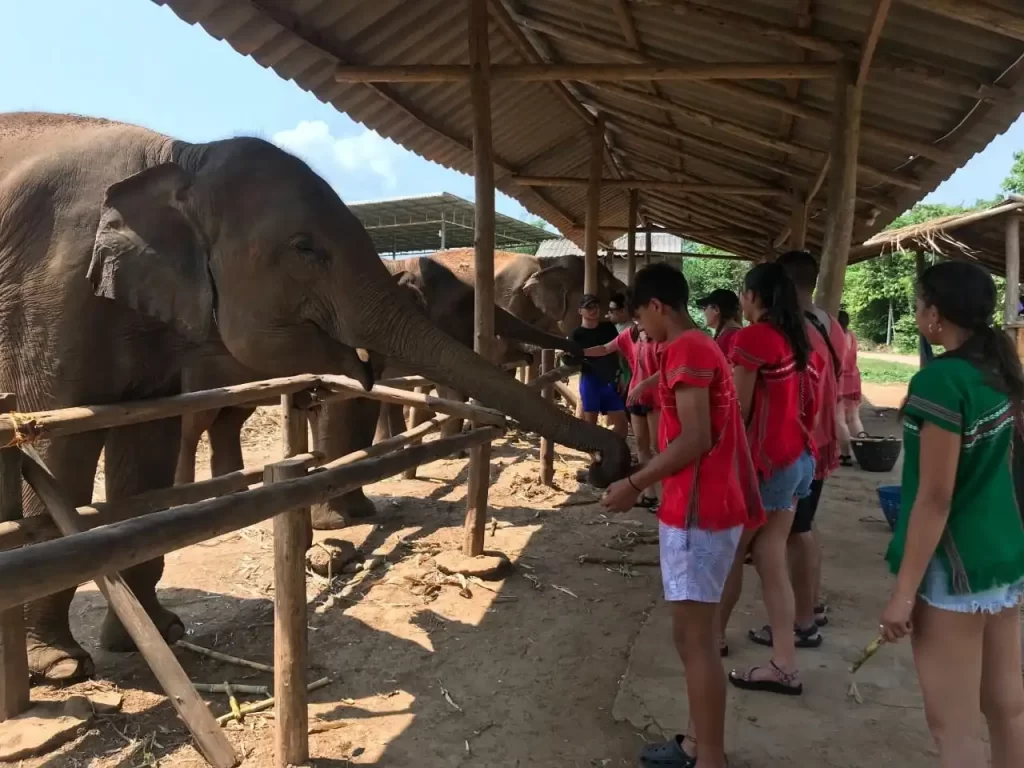

Comparing the Two:
When we compare the daily routines of wild elephants and those living in an Elephant Nature Park, we can see significant differences in how they spend their time. Wild elephants are constantly on the move in search of food and water, engaging in various natural behaviors to survive in their habitat.
The Rehabilitation Process
Rehabilitating elephants is a complex process that involves physical, emotional, and behavioral aspects. At our Elephant Nature Park, the elephants are given the time and space to heal at their own pace. They are provided nutritious food, clean water, and comfortable shelter to ensure their physical well-being, Not to mention a lot of love.
The Transformation
Over time, the rescued elephants at Elephant Nature Parks begin to undergo a remarkable transformation. As they heal from their physical injuries and gain strength from proper nutrition, their bodies start to show signs of recovery. The elephants’ moods also improve as they receive care and attention from the dedicated staff at the park. It is amazing how they responded to this human intervention.
Life After Rehabilitation
Once rehabilitated at our Elephant Nature Park in Chiang Mai, elephants can live in a safe and natural environment for the rest of their lives. Some may be released into protected forest areas, where they can roam freely and reintegrate into the wild. Others may stay at the park to serve as ambassadors for their species, educating visitors about the importance of elephant conservation.
Conclusion
Understanding elephants’ natural habitats and the differences between life in the wild and in captivity is essential for promoting the conservation and welfare of these majestic animals. While an elephant nature park is vital in providing sanctuary and rehabilitation for elephants, efforts must also be made to protect elephants in the wild and address the root causes of human-elephant conflicts. By raising awareness, supporting conservation initiatives, and advocating for ethical wildlife tourism practices, we can ensure a brighter future for elephants in both the wild and captivity.

